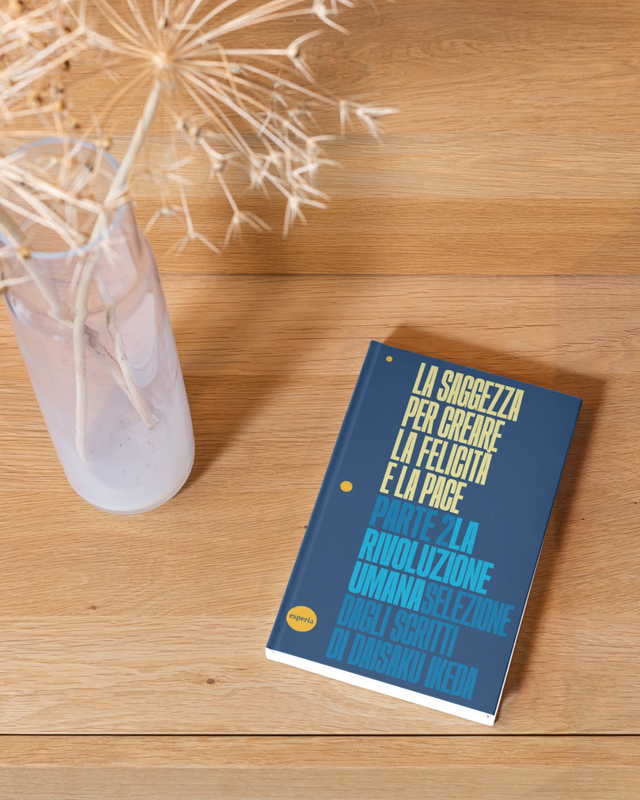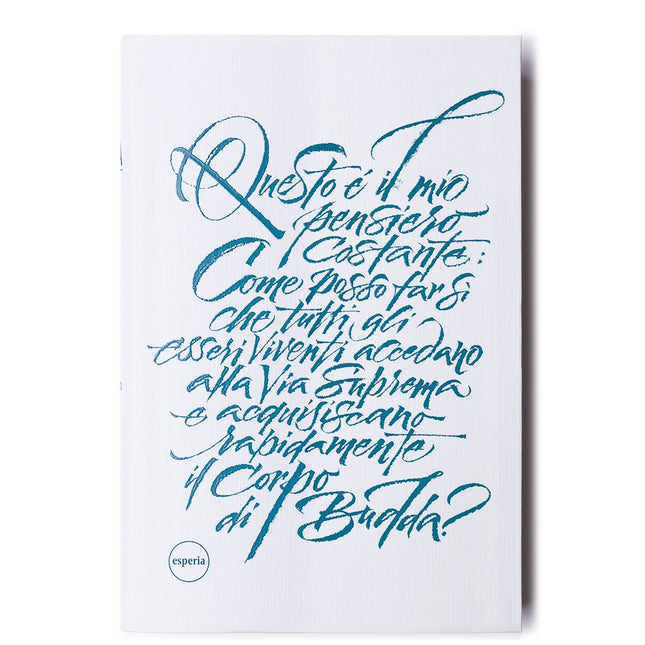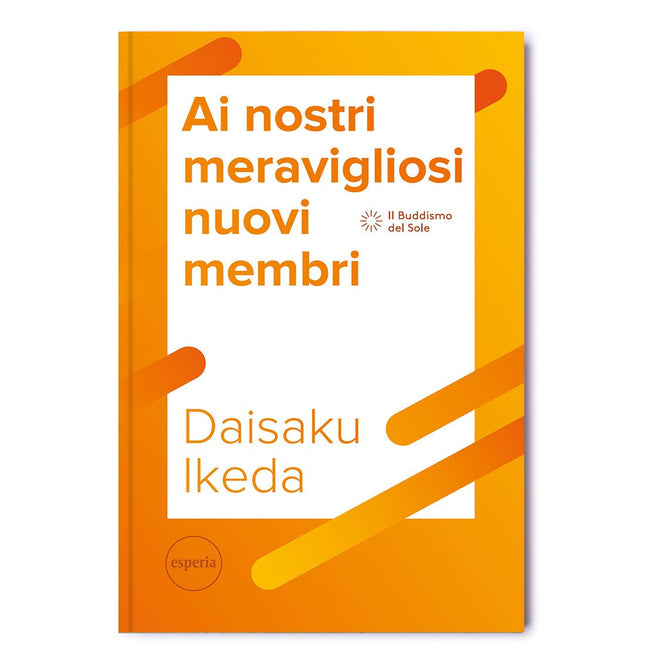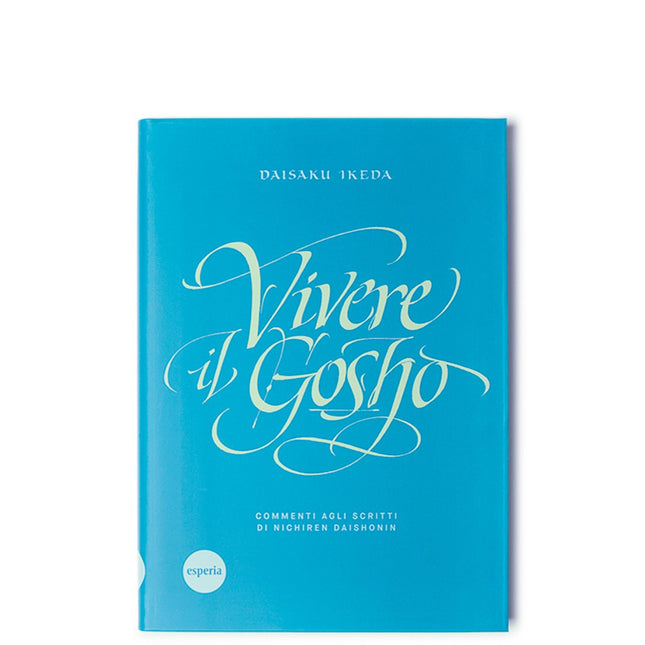
Libri e riviste
-

Esperia Il Sutra del Loto
Edizione completa dei sutra di prologo ed epilogo. Sin dalla sua apparizione in Cina nel III secolo d.C. il Sutra del Loto è stato considerato una delle più importanti scritture del Buddismo Mahayana. Ricco di splendide immagini letterarie e di celebri parabole, rivela che la suprema illuminazione è inerente e accessibile a tutti gli esseri viventi. Per la prima volta viene pubblicata in italiano la versione tradizionalmente conosciuta come “Triplice Sutra del Loto”. Apre il volume il Sutra degli innumerevoli significati, considerato il prologo e articolato in tre capitoli; seguono il Sutra del Loto e il Sutra di Virtù Universale, che ne è l’epilogo. L’edizione italiana si basa sulla traduzione inglese curata da Burton Watson, professore di Lingue e Culture Asiatiche alla Columbia University, uno dei massimi esperti di lingue orientali antiche, in particolare cinese e giapponese.L’edizione italiana si basa sulla traduzione inglese curata da Burton Watson
€25,00
-

Esperia La nuova rivoluzione umana voll. 9/10
Il romanzo autobiografico di Daisaku Ikeda, presidente della SGI. Il 1964 e il 1965 sono anni di impegni intensissimi per Shin’ichi Yamamoto. Il giovane presidente della Soka Gakkai inizia la stesura del romanzo La rivoluzione umana con lo scopo di trasmettere lo spirito del suo maestro Josei Toda. Riversa inoltre tutte le sue energie nel far crescere le “giovani fenici” e nello sviluppare il Seikyo Shimbun, che nel 1965 diventa un quotidiano. Continuano i suoi viaggi in tutto il Giappone e nel resto del mondo per incoraggiare membri e pionieri del movimento di kosen rufu: Stati Uniti, Francia, Germania, Italia, Portogallo e, per la prima volta, il Messico, paese che, poco prima della sua morte, Toda aveva sognato di visitare. Ispirati dalle sue azioni, molti giovani giapponesi si trasferiscono all’estero per dare impulso alla propagazione e sfidare i propri destini personali: kosen rufu va assumendo il profilo di un movimento che abbraccia tutto il mondo.
€20,00
-

Esperia Fede, Pratica e Studio
Fede, pratica e studio sono veramente le forze motrici per la crescita e la vittoria di tutti i membri della Soka Gakkai, Bodhisattva della Terra dal tempo senza inizio. Sono le intramontabili linee guida per l'impegno che profondiamo al fine di realizzare la missione che il Budda ci ha affidato. impegnarsi nella fede, nella pratica, nello studio e abbracciare l'insegnamento corretto, in connessione diretta con Nichiren Daishonin, hanno sempre costituito la tradizione dei membri della Soka Gakkai sin dagli inizi. “Simbolo di speranza illimitata e di passione infinita, il sole non si ferma mai e abbraccia ogni cosa con i suoi raggi compassionevoli. Il Buddismo di Nichiren è il Buddismo del sole.” - Daisaku Ikeda
€7,90
-

Esperia La nuova rivoluzione umana voll. 5/6
Il romanzo autobiografico di Daisaku Ikeda, presidente della SGI. Il viaggio in Europa dell'ottobre 1961 costituisce l'avvio del movimento di kosen rufu nel vecchio continente. Nel gennaio seguente una nuova tappa dei viaggi di Shin'ichi Yamamoto lo conduce in Asia Minore e nel Medio Oriente. Il giovane presidente incontra in ogni paese i pochissimi pionieri della fede buddista e li incoraggia a crescere intorno a sé delle schiere di persone capaci.“Il mondo intero sarà il palcoscenico del nuovo secolo. Negli angoli più remoti del globo ci sono amici che soffrono nell'agonia di una guerra, madri straziate dal dolore e bambini affamati. L'acqua fresca che sgorga dal terreno può trasformare un deserto in un'oasi. Allo stesso modo, la compassione e la saggezza che scaturiscono dal cuore possono trasfromare questo pianeta in un autentico regno di pace e felicità, una terra preziosa eterna. Questo è kosen rufu.”
€20,00
-

Esperia Ai nostri meravigliosi nuovi membri
Nelle cinque lezioni presenti in questo volume, tratte dalla serie “Il Buddismo del sole”, il presidente della SGI Daisaku Ikeda si rivolge in particolare ai nuovi membri, delineando i punti cardine del Buddismo della Soka Gakkai. Dalla non dualità di maestro e discepolo al desiderio di felicità per sé e per gli altri, dallo spirito di alzarsi da soli alla rete di "buoni amici" che troviamo nell'organizzazione, Ikeda illustra la rivoluzione religiosa Soka, una luce di umanesimo che si diffonde in tutto il pianeta e spiega come il samgha, un’armoniosa comunità di praticanti uniti con spirito aperto ed egualitario, svolga un ruolo insostituibile nell’aiutare le persone a portare avanti la propria pratica buddista.
€6,00
-

Esperia Una lanterna nell'oscurità
Citazioni dagli scritti di Nichiren Daishonin sui temi della vita. Nichiren Daishonin scriveva con passione, coraggio, tenerezza e poesia, incoraggiando i discepoli sia nelle questioni dottrinali sia nelle difficoltà quotidiane. Le sue lettere trasmettono una profonda compassione e un chiaro messaggio di come si conduce una vita di genuina felicità.Una lanterna nell’oscurità facilita la ricerca di celebri passi delle scritture di Nichiren. I brani sono organizzati per argomenti legati alla vita quotidiana e sarà quindi agevole individuare incoraggiamenti riferiti a situazioni specifiche. Le “Riflessioni”, brevi estratti dai discorsi di Daisaku Ikeda, offrono ulteriori spunti per capire meglio e far nostro lo spirito del Daishonin.
€13,90
-

Esperia Amore e amicizia
Il primo volume della serie di dialoghi tra il presidente Ikeda e i giovani della SGI affronta i dubbi e le domande dei giovani sulle relazioni più importanti per la loro età: gli amici e i partner sentimentali.
€6,00
-

Esperia Diario Giovanile
Gli anni giovanili di Ikeda ripercorsi attraverso il suo diario. Gli anni tra il 1949 e il 1960 furono per Daisaku Ikeda un periodo di crescita e formazione a fianco del suo maestro: in quel periodo vennero poste le basi per i successori sviluppi del movimento di kosen rufu nel mondo, che prese avvio dopo la nomina di Ikeda a terzo presidente della Soka Gakkai.Nelle pagine del Diario giovanile leggiamo il racconto in presa diretta di quegli anni particolarmente significativi. Entriamo in contatto con un giovane carico di speranze e di ideali, in cerca del vero significato da attribuire alla propria esistenza. Lo vediamo alle prese con i numerosi problemi delle attività quotidiane e desiderio di superare i propri limiti e le proprie debolezze. Questa vicinanza con l'autore permette a ognuno di misurarsi con le scelte da compiere nella propria vita e di sviluppare una più sincera consapevolezza della propria missione.
€29,00
-

Esperia La nuova rivoluzione umana vol. 28
Il presente volume descrive gli eventi che ebbero luogo nel 1978. Il 19 giugno di quell'anno la Soka Gakkai aveva ricevuto dal clero un elenco con oltre trenta domande di natura dottrinale, realizzato sulla base di varie questioni sollevate dai preti, che accusavano la Soka Gakkai di deviare dagli insegnamenti della scuola. Servendosi dell’autorità derivante dal loro ruolo, i preti iniziarono a fare pressioni sui membri affinché lasciassero l’organizzazione e si associassero direttamente ai loro templi come membri "danto", ovvero affiliati laici al tempio. Tra le loro strategie vi era quella di minacciare i membri sostenendo che se fossero rimasti con la Soka Gakkai non sarebbero riusciti a conseguire la Buddità. Shin'ichi Yamamoto profonde tutto il suo impegno per proteggere i membri da questi vili attacchi e per cercare di mantenere l'unità tra il clero e i laici. Nel frattempo, il presidente della Soka Gakkai è sempre impegnato nell'infondere linfa vitale alle attività dell'organizzazione: durante l'arco dell'anno Shin’ichi visita diverse prefetture del Giappone, per offrire incoraggiamenti nella fede; a giugno partecipa alla riunione dei responsabili per il ventunesimo anniversario della Divisione studenti, durante la quale ribadisce le illimitate aspettative che nutre per gli studenti e per ciò che potranno realizzare nel XXI secolo; Shin'ichi utilizza inoltre ogni momento libero tra i suoi numerosi impegni per scrivere il testo di varie canzoni. Infine, nei primi giorni di ottobre del 1978, il presidente Yamamoto partecipa alla prima riunione generale del Dipartimento delle isole remote, offrendo il suo incoraggiamento ai tanti membri giunti alla sede centrale dopo lunghi e impegnativi viaggi da numerose e distanti isole del Giappone. «La nostra crescita nella fede si riflette nella nostra umanità e si manifesta chiaramente nelle nostre parole e azioni pervase da una profonda cura per gli altri. Sarà questa umanità a determinare il futuro di kosen rufu.» Daisaku Ikeda
€20,00
-

Esperia La nuova rivoluzione umana vol. 30
Il romanzo autobiografico di Daisaku Ikeda, presidente della SGI. Nel presente volume, che conclude la Nuova rivoluzione umana, sono descritti numerosi momenti salienti della storia di kosen rufu: dagli eventi che ebbero luogo nei primi mesi del 1979 quando Shin’ichi Yamamoto, dopo essersi dimesso dalla carica di presidente della Soka Gakkai a causa delle infide trame ordite dal clero della Nichiren Shoshu, ergendosi come una irremovibile montagna di fronte a quelle difficoltà, diede l’avvio a una nuova grandiosa fase del movimento di kosen rufu nel mondo, alla sua quinta visita in Cina nel 1980 e in Nord America, Sud America e Unione Sovietica l'anno seguente; dal viaggio in Italia nel 1981, durante il quale Shin’ichi Yamamoto si dedica in modo particolare a incoraggiare e a far crescere i giovani, alle numerose attività nelle varie aree del Giappone. Nel capitolo conclusivo, intitolato Il voto, troviamo infine descritti gli eventi che portarono alla scomunica della Soka Gakkai da parte della Nichiren Shoshu. Il 28 novembre 1991, giorno della scomunica, viene definito da Shin’ichi “una data storica, il giorno della nostra indipendenza spirituale”. È anche il momento in cui la Soka Gakkai spicca definitivamente il volo verso il ventunesimo secolo come religione mondiale. Il capitolo – e l’intero romanzo – si conclude con la descrizione della riunione dei responsabili di centro del 12 novembre 2001 durante la quale Shin’ichi rivolge un accorato appello ai giovani, i Bodhisattva della terra che vivono per il grande voto di kosen rufu, affidando loro il futuro del movimento Soka nel mondo. In cuor suo, Shin’ichi rivolse un appello ai giovani: “Andiamo avanti insieme! Lottiamo finché avremo vita. Avanziamo con fiducia e vigore facendo risuonare in alto il suono della seconda serie delle Sette Campane”. Dentro di sé, Shin’ichi aveva chiara la visione dei giovani Soka che, come giovani aquile maestose, si libravano nella luce dell’alba del terzo millennio. Li vedeva volare in alto, in un flusso ininterrotto, verso gli immensi cieli del mondo.
€20,00
-

Esperia La nuova rivoluzione umana voll. 13/14
Il romanzo autobiografico di Daisaku Ikeda, presidente della SGI. Gli anni 1968 e 1969, di cui si narrano le vicende in questi due volumi, sono decisivi per lo sviluppo della Soka Gakkai, perché vedono il suo presidente Shin’ichi Yamamoto assumere un compito molto delicato e importante. Su invito di alcuni esponenti del governo cinese, Shin’ichi si fa carico di avviare il processo che nel corso di diversi anni porterà alla riapertura delle relazioni diplomatiche tra Cina e Giappone. L’iniziativa provoca naturalmente molte ripercussioni, dato che l’azione del presidente della Soka Gakkai incide su questioni di politica estera rispetto alle quali il governo giapponese ha assunto una posizione molto cauta. Ma Shin’ichi Yamamoto è certo del fatto che i popoli delle due nazioni desiderino la pace e l’amicizia reciproca sopra ogni altra cosa ed è pronto ad affrontare qualsiasi difficoltà pur di vedere realizzato il suo grande obiettivo. «Amici miei, guardate a viso aperto l’infinita catena di calamità e di miserie che affliggono il mondo! Non distogliete lo sguardo dal vortice di sofferenza che costituisce la realtà! Dobbiamo parlare coraggiosamente e costantemente per la felicità e la pace dell’umanità. Dobbiamo offrire al mondo parole sagge e penetranti. E dobbiamo agire. Vivere vuol dire lottare. Questa è la missione e il grande sentiero dei praticanti buddisti.»
€20,00
-

Esperia Vivere il gosho
Passi dagli scritti di Nichiren Daishonin commentati da Daisaku Ikeda.Il libro è organizzato in sette capitoli, ognuno dei quali ha un tema, per agevolare la ricerca dei brani. Gli incoraggiamenti di Daisaku Ikeda che accompagnano le parole di Nichiren ci offrono uno stimolo ad approfondire la fede, rafforzare la nostra pratica e realizzare esistenze autenticamente vittoriose, aiutando anche gli altri a fare lo stesso.Temi trattati: La non dualità di maestro e discepolo, atteggiamento nella fede per affrontare difficoltà, come realizzare vite autenticamente felici e vittoriose, adempiere alla propria missione, l’importanza del dialogo e dell’amicizia, vincere nell’impegno per kosen rufu.
€10,00
Hai visto 36 prodotti su 132













